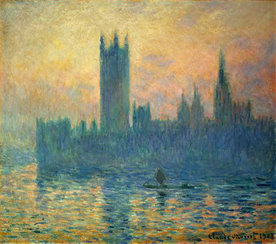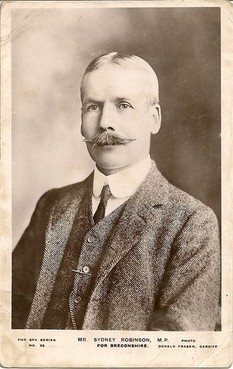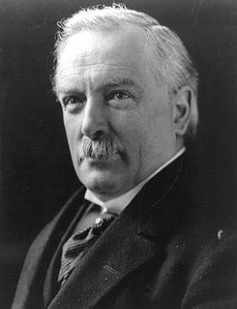
Parliament in Box
Claire Botcherby
April 2014
Claire tells about her family who worked for two Members of Parliament, Charles Morley and Sidney Robinson who both lived in Box.[1]
We have coupled Claire's story with Victor Painter's Memories and an article about AJ Sylvester of Rudloe who was private secretary to Prime Minister David Lloyd George.
Claire Botcherby
April 2014
Claire tells about her family who worked for two Members of Parliament, Charles Morley and Sidney Robinson who both lived in Box.[1]
We have coupled Claire's story with Victor Painter's Memories and an article about AJ Sylvester of Rudloe who was private secretary to Prime Minister David Lloyd George.
 Sidney Robinson MP in 1905
Sidney Robinson MP in 1905
Charles Morley and Sidney Robinson MPs
My grandfather, Reginald Botcherby, worked as private secretary to Charles Morley of Shockerwick House (Liberal MP for Breconshire 1895-1906). The Morleys were a family of Liberal politicians and his father and brother were both MPs. My grandfather seems to have continued working for Morley after 1906 when he stood down as MP.
I have correspondence that would suggest he also worked for Sidney Robinson, Morley’s successor in the Breconshire seat, whose family home was at nearby Winsley House, though it is possible he was just volunteered by Morley to help Robinson out occasionally. By 1911, Kelly’s Handbook shows Sidney Robinson using Ashley House as his contact address, however his letters to my grandfather well after this date continued to be addressed from Winsley House. The 1906 election was a watershed for the Liberal Party who won a majority of 125 seats over all other parties. The election opened the way for a huge range of reforms in people's social conditions including starting Labour Exchanges (Job Centres), free school meals, Old Age Pensions and National Insurance.
Much of the legislation was contained in the 1909 People's Budget of Chancellor David Lloyd George who called the budget: This is a war Budget. It is for raising money to wage implacable warfare against poverty and squalidness. The budget was fiercely opposed by the Conservative members of the House of Lords and led to a reduction in the powers of the Upper Chamber.
My grandfather, Reginald Botcherby, worked as private secretary to Charles Morley of Shockerwick House (Liberal MP for Breconshire 1895-1906). The Morleys were a family of Liberal politicians and his father and brother were both MPs. My grandfather seems to have continued working for Morley after 1906 when he stood down as MP.
I have correspondence that would suggest he also worked for Sidney Robinson, Morley’s successor in the Breconshire seat, whose family home was at nearby Winsley House, though it is possible he was just volunteered by Morley to help Robinson out occasionally. By 1911, Kelly’s Handbook shows Sidney Robinson using Ashley House as his contact address, however his letters to my grandfather well after this date continued to be addressed from Winsley House. The 1906 election was a watershed for the Liberal Party who won a majority of 125 seats over all other parties. The election opened the way for a huge range of reforms in people's social conditions including starting Labour Exchanges (Job Centres), free school meals, Old Age Pensions and National Insurance.
Much of the legislation was contained in the 1909 People's Budget of Chancellor David Lloyd George who called the budget: This is a war Budget. It is for raising money to wage implacable warfare against poverty and squalidness. The budget was fiercely opposed by the Conservative members of the House of Lords and led to a reduction in the powers of the Upper Chamber.
Victor Painter recalled the MPs |
Victor Painter also recalled Charles Morley and Sidney Robinson in his Kingsdown Memories:
My mother went to work each day at Shockerwick House Stables, looking after about 16 grooms that had quarters at the stables to live in. Charles Morley and his family lived in Shockerwick House. |
The cottage next door was let to a Mr Herbert Perry and his wife. Mr Perry worked down at Ashley House in the gardens of an MP, a Mr Robinson. Mr Lloyd George, the Liberal leader, was often staying with Mr and Mrs Robinson, on holidays, and they often played golf on Kingsdown where my dad was the green keeper. Now Mr and Mrs Perry had two children, a girl with the name of May and a boy called Ivor.

AJ Sylvester (1894 - 1994)
A Very Private Secretary
The Story of a Famous Rudloe resident
who served Britain's Liberal Prime Minister,
David Lloyd George, for 22 years
Alan Payne
March 2014
Left: Prime Minister David Lloyd George
A Very Private Secretary
The Story of a Famous Rudloe resident
who served Britain's Liberal Prime Minister,
David Lloyd George, for 22 years
Alan Payne
March 2014
Left: Prime Minister David Lloyd George
Albert James Sylvester lived in the parish of Box at Rudloe Cottage on a smallholding at the end of his life. After 1949 he had farmed at Chippenham. And at one time he is recorded in the Guinness Book of Records as the oldest competitive ballroom dancer in 1975 at the age of 86. But his lasting fame is that for 22 years after 1923 he was private secretary to Britain's ex-Prime Minister David Lloyd George.[2]
During these years Lloyd George was discredited politically for deserting the Liberal Party and forming a coalition government during the Great War. But Lloyd George was still a significant, if somewhat errant, presence. In 1935 he launched a dramatic New Deal for economic regeneration and a Council of Action for Peace and Reconstruction. All of this was overshadowed by the visit that Sylvester and Lloyd George made to Hitler in 1936.
With a hint of disagreement, AJ wrote that Lloyd George: returned to the Grand Hotel in a state of great elation. It was clear to us all that he had been tremendously impressed by Hitler and to me, at all events, it seemed that he was spell-bound by Hitler's astonishing personality and manner. Sylvester took an amazing film of the trip to see Hitler and Ribbentrop (the Nazi Foreign Minister).[3]
During these years Lloyd George was discredited politically for deserting the Liberal Party and forming a coalition government during the Great War. But Lloyd George was still a significant, if somewhat errant, presence. In 1935 he launched a dramatic New Deal for economic regeneration and a Council of Action for Peace and Reconstruction. All of this was overshadowed by the visit that Sylvester and Lloyd George made to Hitler in 1936.
With a hint of disagreement, AJ wrote that Lloyd George: returned to the Grand Hotel in a state of great elation. It was clear to us all that he had been tremendously impressed by Hitler and to me, at all events, it seemed that he was spell-bound by Hitler's astonishing personality and manner. Sylvester took an amazing film of the trip to see Hitler and Ribbentrop (the Nazi Foreign Minister).[3]
AJ was extremely discreet and loyal to his employer. In the book he wrote in 1947 called The Real Lloyd George he scrupulously refused to write about Lloyd George's marital indiscretions, the details of which he kept until death.
In his 80s and 90s Sylvester became a media celebrity. In 1974 his life was featured in a BBC TV programme The Very Private Secretary. In 1981 he personally appeared on the BBC again in a series The Life and Times of Lloyd George. AJ Sylvester, in extreme old age, had indeed become something of a celebrity and a household name throughout the land. Aged 93 in 1982, he featured in a Radio 4 profile of his life.
In his 80s and 90s Sylvester became a media celebrity. In 1974 his life was featured in a BBC TV programme The Very Private Secretary. In 1981 he personally appeared on the BBC again in a series The Life and Times of Lloyd George. AJ Sylvester, in extreme old age, had indeed become something of a celebrity and a household name throughout the land. Aged 93 in 1982, he featured in a Radio 4 profile of his life.
References
[1] Robinson signed his letters Sidney with an ‘i’. And this is how he is listed in Debrett’s House of Commons for 1908 and Kelly’s Handbook for 1911, although there are photos of him with the spelling Sydney. There was another Liberal politician named Sydney Robinson around at the time, based in Essex, who kept standing for Parliament, but failed to get in.
[2]This article is indebted to several works by Dr J Graham Jones including Journal, Liberal History, 2007 and at:
http://welshjournals.llgc.org.uk
[3] AJ's incredible home movie of Hitler and the Nazi leadership is available to view at
http://www.archif.com/index.php?id=5145&tx_bddbflvvideogallery_pi1[video]=44
[1] Robinson signed his letters Sidney with an ‘i’. And this is how he is listed in Debrett’s House of Commons for 1908 and Kelly’s Handbook for 1911, although there are photos of him with the spelling Sydney. There was another Liberal politician named Sydney Robinson around at the time, based in Essex, who kept standing for Parliament, but failed to get in.
[2]This article is indebted to several works by Dr J Graham Jones including Journal, Liberal History, 2007 and at:
http://welshjournals.llgc.org.uk
[3] AJ's incredible home movie of Hitler and the Nazi leadership is available to view at
http://www.archif.com/index.php?id=5145&tx_bddbflvvideogallery_pi1[video]=44